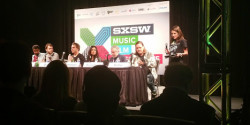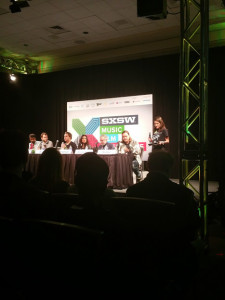 I spent last week at the SXSW conference in Austin. This post begins a series of articles about what I saw and heard, and what I think it might mean for radio. I’ll get to radio soon, but first I want to narrate my way through one of the conference’s highlights, a panel titled “The Celebrity Economy in Music.” The main question for the group was how do bands make money in the relatively new digital system? How much have the conditions for generating income changed? To the discussion came, among others, Win and Will Butler of Arcade Fire and Tatiana Simonian of Nielsen Entertainment. The top celebrity on the panel, however, was economist Paul Krugman. The big newspaper reporters in the room understandably made quite a meal out of his presence (Chicago Tribune headline: “SXSW gets a Paul Krugman economics power lesson”), but what struck me was his restraint. The Nobel prize winning columnist for The New York Times commented sparingly and even sat a bit humbly among the panelists.
I spent last week at the SXSW conference in Austin. This post begins a series of articles about what I saw and heard, and what I think it might mean for radio. I’ll get to radio soon, but first I want to narrate my way through one of the conference’s highlights, a panel titled “The Celebrity Economy in Music.” The main question for the group was how do bands make money in the relatively new digital system? How much have the conditions for generating income changed? To the discussion came, among others, Win and Will Butler of Arcade Fire and Tatiana Simonian of Nielsen Entertainment. The top celebrity on the panel, however, was economist Paul Krugman. The big newspaper reporters in the room understandably made quite a meal out of his presence (Chicago Tribune headline: “SXSW gets a Paul Krugman economics power lesson”), but what struck me was his restraint. The Nobel prize winning columnist for The New York Times commented sparingly and even sat a bit humbly among the panelists.
When he did speak, though, everybody listened.
“Things have changed a lot less for musicians, for the artists, than you might think,” Krugman noted, citing the work of Princeton economist Alan Krueger. “Even in the eighties, when the industry was making money hand over fist from CDs, artists earned about seven times as much from from live performances as they did from royalties. It’s always been really about the live performance as far as the artist was concerned.”
This was followed by a strained exchange between Will Butler and Simonian. Panel moderator Rembert Browne of Grantland asked all the panelists if branding deals (or “in your face branding,” as Browne put it) between bands and companies had perhaps gone a bit too far.
To which Simonian replied:
“I originally did academic work on the globalization of the music industry. And I used to be of the street cred, anti-selling out mentality as an artist and I learned that street creds didn’t pay my bills very well. Or maybe I wasn’t that good as an artist, but I think that the dialogue has changed in a way that brands also become a big revenue source for artists. But in any partnership there’s a negotiation going on. You should be doing a cost/benefit analysis. If you are not comfortable with the terms of that sponsorship then you don’t have to accept it. They want something from you. Probably your cool factor, or who you are. And on the other token you want something from them, the revenue factor . . . “
Simonian continued that she found “branded music to be a really intriguing space for emerging artists,” and added that Chipotle ” . . . will give emerging artists cards to get free burritos. When I was a touring artist and they did not have per diems I would have been stoked to get free burritos on the road instead of having to eat walnuts . . . I don’t think it has to be looked at necessarily as a big selling out . . . ”
At this point, an obviously exasperated Will Butler chimed in.
“It is selling out, though just for the record,” Butler said, as the audience laughed.
“Well, I guess it’s whether you can afford to think that,” Simonian replied.
“Yeah,” Butler shot back, “you can afford to get a Chipotle burrito, if you are managing your tour right, in my opinion.”
“Well, you know . . . ” Simonian grumbled.
My God, I thought to myself at this point. They’re fighting over burritos.
Then Krugman chimed in again. “I don’t know anything at all,” he began (which provoked howls of laughter from the room), but “one of my employers is in something of the same situation” (referring to the challenges of digitization). “The New York Times as a business is basically an advertising platform for luxury goods wrapped in a little bit of news . . . The whole question is how does the institution deal with that? Does it allow itself to be corrupted?”
Following this question, the conversation more or less tread water over a sea of laments about the vicissitudes of making money in the digital economy. The “Beats Pill” branding logo kept coming up in the discussion. My jaw dropped at Win Butler’s prediction.
“I think a lot of artists will make money from their parents,” he said a bit haltingly. The audience guffawed. This gave the Butlers a little more courage. “I don’t know if you know this but that’s a giant way that a lot of bands are around today, their parents pay for things,” one added. “And it’s great! That’s how we bought our first tour bus. Our parents bought it for us!”
No wonder they could afford burritos, I thought.
At some point an amused Krugman spoke of the “bank of mom and dad.” But nobody laughed when he said this: “What has not changed is that performance is where the money is. What has changed is that we have a one percent phenomenon on revenues and performance. . . . The share of that revenue is going to a few bands at the top.” Small bands, he explained, are getting “a shrinking share of the pie.”
The question for me is how radio fits into this new digital economy. If most artists make most of their money, such as it is, from touring, what exactly is the point of getting on AM/FM any more? I spoke to a lot of young musicians about this question, and many of them weren’t sure themselves. Next journal entry coming soon.
Next entry: do young musicians want or need AM/FM any more?




